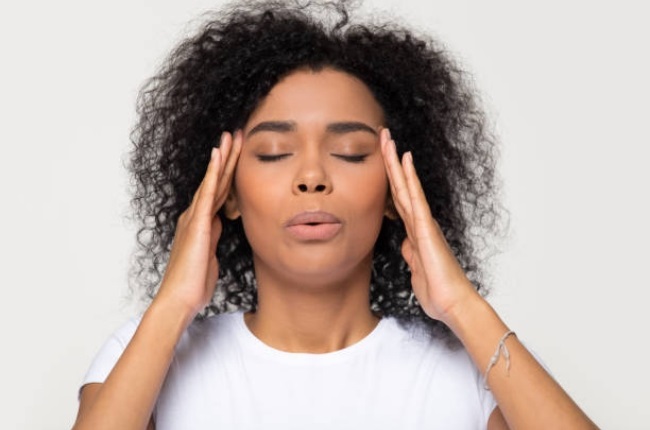
The cost of living is going through the roof. Covid is still a threat. Corruption and loadshedding continue and then there’s that war in Ukraine – it’s no wonder many of us feel a rising sense of panic in our daily lives.
The world is a scary place so it’s only natural that anxiety can threaten to overwhelm us. Many seek counselling and even medication in order to cope, but a new book by psychiatrist Dr Ellen Vora explores a more holistic approach to anxiety.
In this extract from The Anatomy of Anxiety: Understanding and Overcoming the Body’s Fear Response, she offers self-soothing tools and techniques that will help put your mind at ease in our pressured modern world.
When you notice feelings of anxiety – that hypervigilant feeling that escalates swiftly to a sense of catastrophe and doom – it can seem as if everything is conspiring to overwhelm you.
But many of these feelings are more likely to be the brain’s attempts to justify the stress messages it’s receiving from your body. The brain then offers a narrative for why we feel uneasy, perhaps picking work, a toxic relationship or the situation in Ukraine.
Micro-stresses such as a sleepless night, too much caffeine, a blood-sugar roller coaster, hormonal imbalances, inflammation or unhappy gut bacteria can trigger the release of stress hormones that, over time, signal a state of emergency to the brain.
By dealing with the physiological tresses ( for example, limiting your access to 24-hour news), you can reduce levels of the stress hormones and find a sense of calm.
Consider anxiety as an invitation to explore what might be subtly out of balance in your body and life. Changing these are your initial quick wins and will give you a clearer headspace to assess whether you need to tackle more challenging forms of anxiety that might lie beneath.
Profound anxiety that exists beyond the physiological – such as the death of a loved one, loss of a job, a relationship break-up or fear for your life – can’t be addressed so easily. But even if your anxiety comes from being in a dead-end job or a toxic marriage, this process can still help you identify your cue to act.
Rule out if you have ‘hanxiety’
With most of my patients I start with the assumption that their anxiety is a bloodsugar issue until proved otherwise. Our bodies are vulnerable to glitches in blood-sugar regulation, causing us to swing up and down throughout the day, with every blood-sugar crash generating a stress response.
Given that the modern diet is so bloodsugar destabilising, these stress responses are at the root of much of the anxiety I see.
If you know you can be “hangry” – hungry and angry – you probably also get “hanxious” too when your blood sugar is low. Take a good look at your diet and the role blood sugar plays in your mood. Stabilising your blood sugar – with regular meals packed with protein, fibre and healthy fats – will help your anxiety.
Try this: eat a spoonful of almond butter or coconut oil at regular intervals throughout the day to keep your blood sugar stable.
Sitting down is the new smoking
Being at a desk for long periods can be enough to prompt anxiety. The neck and shoulder position we hold during extended hours at the computer and staring at our phones can impact blood flow to the brain. Desk work puts tension in the muscles of the neck, upper back and jaw, all of which are connected with our sympathetic nervous system that controls stress, telling our brains we’re anxious.
Similarly, the fixed position of our eyes on the screen and the clenching of the jaw and the “shrug” muscles that link our shoulders to our neck unconsciously signal to our brains that we’re in a stressful situation – whether we are or not. When we focus on the screen, our eyes widen at times just as they would in a state of fear. This prompts levels of stress hormones to build.
Check your working ergonomics (the kind of chair you have and the height of your desk in relation to it), take periodic breaks to rest your eyes and when you can, put technology aside to take a few unplugged minutes outside.
Exercise is the new Xanax
Finding a form of exercise that works for your life is key because exercise is a proven antianxiety agent. It encourages our body to release homegrown pain relief (endorphins), but even small amounts of movement can significantly reduce anxiety and improve energy levels.
The right prescription is anything that feels good for you and can realistically fit into your life.
Restart your body by shaking it off
When you feel overwhelmed by stress, put on rhythmic music, close your eyes, allow a soft bend in your knees and let your body feel loose like a ragdoll. Then shake.
Full body shaking is like pressing ctrlalt-delete on your keyboard, breaking you out of the stress response. It appears to tell the nervous system that the threat has passed and you’re safe now.
Pull yourself back to the present
Pure panic can escalate fast if you find yourself “future tripping” – predicting imminent disaster – or dwelling on the past. The key is finding the strength to pull yourself back to the present. Think of present-moment awareness as garlic to the panic vampire. For a first quick fix, try splashing cold water on your face or opening a window for a blast of fresh air.
Another effective grounding technique is to count five things you can see, four things you can touch, three things you can hear, two things you can smell and one thing you can taste. This trains your attention on the present moment.
Practise 4-7-8 breathing: inhale for a count of four, hold for seven and exhale for eight.
Finally, aim to shift your perspective so you see panic as an indication that your body is functioning properly, rather than an indication that something is going wrong. This takes the emotional power out of the reaction, reframing it with curiosity and appreciation, rather than fear.
The magic of magnesium
The mineral magnesium is involved in hundreds of biochemical reactions in the body and supplements help with insomnia, anxiety, depression, migraines, menstrual cramps and muscle tension.
Take 100-400mg of magnesium glycinate at bedtime or up your food sources (dark chocolate, pumpkin seeds, avocados, bananas and almonds).
Run through the questions below whenever you feel anxious. It will identify possible triggers and match them with effective remedies.
- I’m anxious and I’m not sure why. Am I:
- Having a blood-sugar crash or a chemical come down? Did I recently eat something sweet, processed or laden with food colouring or preservatives? Have a healthy snack and recognise your triggers next time.
- Overcaffeinated? Perhaps this jittery anxiety is caffeine sensitivity. Tomorrow drink one fewer cup.
- Undercaffeinated? I drank less caffeine today than usual. Dose up and aim for consistent daily caffeine consumption going forward.
- Tired? Have a nap. Prioritise an early bedtime.
- Dehydrated? Drink some water.
- Feeling sluggish? Take a quick walk outside or dance.
- Drunk or hungover? File this away to inform future choices around alcoho
THIS IS AN EDITED EXTRACT FROM THE ANATOMY OF ANXIETY: UNDERSTANDING AND OVERCOMING THE BODY’S FEAR RESPONSE BY ELLEN VORA (ORION BOOKS).




 Publications
Publications
 Partners
Partners



















